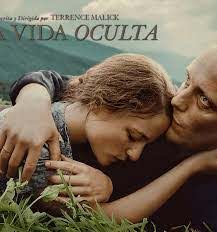A hidden life

We are in the last story that Terrence Malick, the filmmaker of transcendence, tells us. In the middle of beautiful mountain landscapes, of an intense green color, the camera brings us closer to the family of Franz and Fani, and their three girls, in a small Austrian village of farmers and shepherds. The varied scenes of his daily life excite us: they work, live together, play, they are happy, they embrace each other, they relate to the neighbors, with affection, peace and empathy. Then there are black and white images of the start of the war, in 1939, of the rise of Nazism with Hitler at the helm, and of official soldiers also stationed in Austria. Franz not only disagrees with the war, but opposes pledging allegiance to Hitler and Nazi values; he is opposed in conscience, out of fidelity to what he believes. “We razed cities at night, we killed innocents, and we prayed on Sundays. What about our country? " From there, nothing will be the same for him and his family.
Franz is not a hero who protests and fights against, or who tries to change the situation with his actions; He is simply a man who wants to be faithful to his conscience, and to say no to what threatens his beliefs, to what he believes is against humanity, and to what his faith asks him to follow Jesus Christ and his truth. The entire film is the story of this loving fidelity: fidelity to himself, to his family, to his people, to God. A faithful love lived in the same daily existence, without great actions or rudeness, only what reality asks of it. And it will demand a lot, even life. But also the sacrifice of leaving his family alone, at the mercy of the humiliations and contempt of his countrymen. In 1943, Franz is taken prisoner to Enns and then to Tegel, Berlin, to be tried as a traitor to the nation.
The film delves into the experience of that year in prison, through encounters and trials with the authorities, letters to the wife, and happy memories of life. Then, in the midst of uncertainty and suffering, what gives meaning, deep sense and hope arises, although others do not understand it or do not see it. It is invisible to others, but not to Franz. They are all the moments lived of happiness and beauty, which give truth and support in the midst of the ugliness and evil of the historical moment. Thus, the happiness of that motorcycle trip to meet Fani for the first time: the camera takes the shot of Franz driving the motorcycle towards the horizon, perfectly composed in a balance of symmetries; a horizon that makes its way through the mountain and is touched by a large and inexhaustible light that welcomes it, so small. That emotional memory is for Malick, the director, the ability to embrace transcendence in the midst of simple everyday life. As are also the images of the fields, the canyons, the mountains, the sky, -all filmed with a wide angle-, because life is still there exuberant and generous despite all our meanness and violence.
Also the shots in which the protagonist in prison looks up at the sky and is filled with a light that caresses him and gives him hope. In this way, the gaze towards infinity, the divine is not shown in the first place as salvation but as strength, as reconciliation, as peace. Franz can thus pray in prison: "The Lord leads me to calm fountains and repairs my strength ... Although I pass through a dark valley, I fear nothing, because You are with me" (Psalm 23), and also: "For you, the darkness it is not dark, and the night shines like the day ”(Psalm 139, 12).
The words that the historical Franz wrote in the last letter to his wife Franziska are moving: "I also thank our Savior because I have been able to suffer for him. I trust in his infinite mercy. I hope he has forgiven me everything and that he does not abandon me in my last hour ... Follow your commandments, with the grace of God, we will see each other again in heaven soon. " And her words: "I love you and I'm with you in whatever comes."
Franz Jägerstätter was sentenced to death by the Third Reich and died in Brandenburg prison on August 9, 1943, at the age of 36. Pope Benedict XVI declared his beatification as a martyr to the faith, which took place in Linz on October 26, 2007. The ceremony was attended by his 94-year-old widow and three daughters.
The film won the SIGNIS award at Cannes in May 2019. Terrence Malick takes the title of his Middlemarch film: A Study of Province Life, a novel by George Eliot (pseudonym Mary Anne Evans), published in 1874, when He says: "Improving the world depends, in part on events not recorded by history ..., on people who faithfully lived a hidden life, and rest in unvisited graves."
Malick achieves in A Hidden Life an ode to the simple and anonymous man, to the man faithful to his convictions, to the man who loves what he believes, in the midst of a society - also ours - of appearance, inconsequence, intolerance (even among Catholics, as we see in the film). With his well-groomed aesthetic, Malick confesses his hope that, despite everything, when we are so lost in ideologies and uncertainty, the beauty of creation continues to embrace us in each of the moments when someone has known how to live meaningfully. an ordinary life. Those memories reconcile us as humanity.






